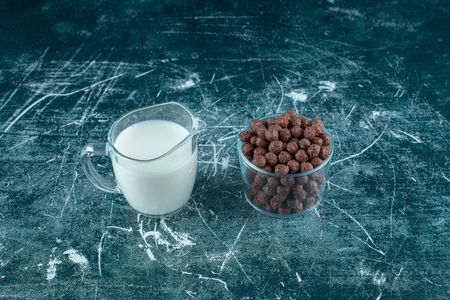TOP 7 Best Alternative Milks for Coffee and Tea
 Velma Martinez
12 Feb, 2025
13 mins read
106
Velma Martinez
12 Feb, 2025
13 mins read
106

We're here to help you find the best milk alternatives for your coffee and tea drinks. We'll look at all the options and discuss how the taste of alternative milks can impact your morning brew.
PS: we are considering the situation of adding milk to a hot drink. General advice and even a recipe: the temperature of milk and extract (coffee or tea) should not differ much. If you drink hot tea and want to add alternative milk, then warm it up a little before adding it to the drink. This will avoid the stratification process.
1. Soy milk
For a long time, soy milk was the main dairy alternative available in cafes and on supermarket shelves. So for many people, it is a familiar alternative to regular milk and remains the most popular plant milk.
It is made by grinding and soaking soybeans, boiling the mixture and filtering out the remaining solids.
Benefits of Soy Milk
- Distributed in supermarkets and cafes
- It is one of the cheapest types of non-dairy milk.
- Creamy texture
- Rich in protein and low in sugar.
Cons of Soy Milk
- It's not very sweet, so it may not be the best alternative to milk if you have a sweet tooth.
- It separates when poured into a hot drink (unless you warm it up first).
2. Almond milk
Almond milk is undoubtedly one of the most well-known and loved plant-based milk substitutes.
It is made by soaking almonds for up to eight hours. The nuts are put through a blender with a little water, sometimes with vanilla added. It is then strained through a cloth to obtain a smooth consistency.
Almond milk has a distinct nutty flavor.
However, like soy milk, almond milk can separate and flake.
Benefits of Almond Milk
- There are different types and flavors
- Low calorie - usually 20-35 calories per 100 ml.
- It has a nutty flavor.
- It is often fortified with nutrients such as calcium, vitamin D, and vitamin E.
Cons of Almond Milk
- The nutty flavor may be a drawback if you prefer a neutral flavor closer to dairy milk.
- It separates when you pour it into a hot drink (it needs to be heated or foamed first).
3. Coconut milk
When you think of coconut milk, you probably picture tropical destinations with sun-drenched beaches and palm trees swaying in the breeze. But coconut milk is in demand in any location and climate, not just the tropics.
Coconut milk isn't the slightly clear liquid that comes out of a fresh coconut - it's coconut water. Coconut milk is made by grinding up fresh coconut meat and mixing it with water, making it a super milk alternative.
It has a sweet, floral, nutty aroma that gives tea and fresh coffee a unique taste. The sweetness of this milk makes it a priority among consumers, but it is worth remembering that it contains a lot of saturated fat.
Pros
- It creates creamy hot drinks.
- It has a delicious taste
- It is widely available.
Cons
- High in saturated fat
4. Oat Milk: The New Favorite in the Plant-Based World
This vegan drink is made by mixing oats and water and then straining the liquid. It appeared on the Russian market relatively recently, but its popularity has recently increased dramatically.
It's easy to see why it's become a favorite choice for many people. It's smooth, creamy, and naturally sweet, making it the closest thing to regular milk.
And the best thing about it is that it doesn’t flake!
It is also one of the most environmentally friendly plant-based dairy products.
There are only a few downsides to this option, and they all have to do with nutrition. Oat milk is high in sugar and has more calories than other plant-based milks. It’s also not as nutrient-dense as other alternatives.
But if you prefer to indulge without worrying about calories or sugar intake, oat milk is the best plant-based milk to use when you want to make the perfect cup of tea or coffee.
Pros
- Smooth and creamy texture
- It has a naturally sweet taste, so there is no need to add sugar.
- It tastes similar to cow's milk, giving your cup a neutral taste.
- Doesn't flake!
- As a new favourite, it is available in most cafes and supermarkets.
- It is also great for other types of hot drinks, such as hot chocolate, as it has a delicious creamy taste and foams easily.
Cons
- High sugar content
- It has more calories than other plant-based dairy products, typically 42 calories per 100 ml.
- Not very rich in nutrients.
5. Cashew Milk: A Health-Boosting Option
Like soy milk and almond milk, cashew milk is made by mixing the nut with water. It is then strained, resulting in a beloved beverage known for its creamy, nutty flavor and impressive health benefits. For example, unlike regular milk (cow's milk), cashew milk is cholesterol-free!
Not only that, but about 75% of the fat in cashews is unsaturated fatty acids, primarily oleic acid, which helps promote heart health. The fat in cashew milk may reduce the risk of heart disease.
Pros
- Great taste, creamy texture and nutty aroma
- Low calorie - typically only 25 calories per 100 ml.
- Supports heart health
- Does not contain cholesterol.
Cons
- It may delaminate.
- Not as widely available as other plant-based milks (although it is slowly appearing in more cafes and supermarkets).
6. Rice milk: an ideal choice for those who suffer from allergies
This dairy-free creation is made from white or brown rice ground with water.
It is known to be the least allergenic of all non-dairy milks, making it the safest choice for those who are sensitive to certain ingredients.
Rice milk is generally mild in flavor with a natural sweetness and no added sugar. It has a slightly watery consistency and contains the same amount of calories as cow's milk.
However, it has almost twice the amount of carbohydrates, which can be a bit off-putting.
Pros
- It is the least allergenic alternative to milk.
- Mild taste
- Natural sweetness.
Cons
- It delaminates when cold
- It contains a lot of carbohydrates.
7. Macadamia Milk: A delicious, low-fat, low-calorie milk
Interestingly, macadamia milk is mostly water - only 3% contains macadamia nuts! However, it is richer, creamier and smoother than most alternatives, making it a favorite for many alternative lovers.
Macadamia milk contains only a third of the calories found in cow's milk, and half the fat. Its low carbohydrate content also makes it a popular choice for people with diabetes or those looking to cut back on carbohydrates.
Whatever your reason for choosing it, expect great taste without the guilt!
Pros
- It's rich, creamy and smooth.
- It is low in calories, fat and carbohydrates.
- It is a great choice for people who lead a healthy lifestyle or even for those who suffer from diabetes.
Cons
- It's hard to find - you may have to order it online or look in health food stores
- It is more expensive than other types of vegan milk.
To sum it up
We've listed seven great dairy-free milk options, but which one is the best?
If you're looking to replace regular cow's milk with dairy-free alternatives, choosing the best option depends on your personal preferences and any allergies you may have.
But if you want our opinion, here are our top plant-based milk picks for using in coffee and tea drinks.
Our winner: Oat milk is the best alternative to cow's milk.
It imparts natural sweetness without any foreign flavors, without interrupting the taste and aroma of the main component of the drink - coffee or tea.
Plus, it's easy to find in any supermarket or cafe. Oat milk is versatile and makes a great addition to a cup of coffee, tea or hot chocolate - so it's worth having in your fridge.
Second place goes to cashew milk
Cashew milk has many of the same benefits as oat milk, but has a few key differences. It is lower in calories, fat, and carbohydrates, and is suitable for those with diabetes.
Why didn't it make it into our ranking?
For two reasons: firstly, it is not easy to get, and secondly, it is not suitable for those who are allergic to nuts.
Written By:
Velma Martinez



Hotels at your convenience
Now choose your stay according to your preference. From finding a place for your dream destination or a mere weekend getaway to business accommodations or brief stay, we have got you covered. Explore hotels as per your mood.





